- Home
- Peter V. Brett
The Warded Man Page 4
The Warded Man Read online
Page 4
Ragen didn’t care for the offer, though. His eyes went hard again, and he slammed his hand down on the table. Dasy and Catrin looked up from their cleaning at the sound.
“To the Core with your credit!” he growled. “I’m not one of your bumpkins, and unless you want the guild to know you for a cheat, you’ll not mistake me for one again.”
“No hard feelings!” Rusco laughed, patting the air in that placating way he had. “Had to try … you understand. They still like gold up there in Miln?” he asked with a sly smile.
“Same as everywhere,” Ragen said. He was still frowning, but the anger had drained from his voice.
“Not out here,” Rusco said. He went back behind the curtain, and they could hear him rummaging around, raising his voice to still be heard. “Out here, if you can’t eat something, or wear it, paint a ward with it, or use it to till your field, it’s not worth much of anything.” He returned a moment later with a large cloth sack he deposited on the counter with a clink.
“People here have forgotten that gold moves the world,” he went on, reaching into the bag and pulling out two heavy yellow coins, which he waved in Ragen’s face. “The miller’s kids were using these as game pieces! Game pieces! I told them I’d trade the gold for a carved wood game set I had in the back; they thought I was doing them a favor! Ferd even came by the next day to thank me!” He laughed a deep belly laugh. Arlen felt like he should be offended by that laugh, but he wasn’t quite sure why. He had played the Millers’ game many times, and it seemed worth more than two metal disks, however shiny they might be.
“I brought a lot more than two suns’ worth,” Ragen said, nodding at the coins and then looking toward the bag.
Rusco smiled. “Not to worry,” he said, untying the bag fully. As the cloth flattened on the counter, more bright coins spilled out, along with chains and rings and ropes of glittering stones. It was all very pretty, Arlen supposed, but he was surprised at how Ragen’s eyes bulged and took on a covetous glitter.
Again they haggled, Ragen holding the stones up to the light and biting the coins, while Rusco fingered the cloth and tasted the spices. It was a blur to Arlen, whose head was spinning from the ale. Mug after mug came to the men from Catrin at the bar, but they showed no signs of being as affected as Arlen.
“Two hundred and twenty gold suns, two silver moons, the rope chain, and the three silver rings,” Rusco said at last. “And not a copper light more.”
“No wonder you work out in a backwater,” Ragen said. “They must have run you out of the city for a cheat.”
“Insults won’t make you any richer,” Hog said, confident he had the upper hand.
“No riches for me this time,” Ragen said. “After my traveling costs, every last light will go to Graig’s widow.”
“Ah, Jenya,” Rusco said wistfully. “She used to pen for some of those in Miln with no letters, my idiot nephew among them. What will become of her?”
Ragen shook his head. “The guild paid no death-price to her, because Graig died at home,” he said. “And since she isn’t a Mother, a lot of jobs will be denied her.”
“I’m sorry to hear that,” Rusco said.
“Graig left her some money,” Ragen said, “though he never had much, and the guild will still pay her to pen. With the money from this trip, she should have enough to get by for a time. She’s young, though, and it will run out eventually unless she remarries or finds better work.”
“And then?” Rusco asked.
Ragen shrugged. “It’ll be hard for her to find a new husband, having already married and failed to bear children, but she won’t become a Beggar. My guild brothers and I have sworn that. One of us will take her in as a Servant before that happens.”
Rusco shook his head. “Still, to fall from Merchant class to Servant …” He reached into the much lighter bag and produced a ring with a clear, sparkling stone set into it. “See that she gets this,” he said, holding the ring out.
As Ragen reached for it, though, Rusco pulled it back suddenly. “I’ll have a message back from her, you understand,” he said. “I know how she shapes her letters.” Ragen looked at him a moment, and he quickly added, “No insult meant.”
Ragen smiled. “Your generosity outweighs your insult,” he said, taking the ring. “This will keep her belly full for months.”
“Yes, well,” Rusco said gruffly, scooping up the remains of the bag, “don’t let any of the townies hear, or I’ll lose my reputation as a cheat.”
“Your secret is safe with me,” Ragen said with a laugh.
“You could earn her a bit more, perhaps,” Rusco said.
“Oh?”
“The letters we have were meant to go to Miln six months ago. You stick around a few days while we pen and collect more, and maybe help pen a few, and I’ll compensate you. No more gold,” he clarified, “but surely Jenya could do with a cask of rice, or some cured fish or meal.”
“Indeed she could,” Ragen said.
“I can find work for your Jongleur, too,” Rusco added. “He’ll see more custom here in the Square than by hopping from farm to farm.”
“Agreed,” Ragen said. “Keerin will need gold, though.”
Rusco gave him a wry look, and Ragen laughed. “Had to try … you understand!” he said. “Silver, then.”
Rusco nodded. “I’ll charge a moon for every performance, and for every moon, I’ll keep one star and he the other three.”
“I thought you said the townies had no money,” Ragen noted.
“Most don’t,” Rusco said. “I’ll sell the moons to them … say at the cost of five credits.”
“So Rusco Hog skims from both sides of the deal?” Ragen asked.
Hog smiled.
Arlen was excited during the ride back. Old Hog had promised to let him see the Jongleur for free if he spread the word that Keerin would be entertaining in the Square at high sun the next day for five credits or a silver Milnese moon. He wouldn’t have much time; his parents would be readying to leave just as he and Ragen returned, but he was sure he could spread the word before they pulled him onto the cart.
“Tell me about the Free Cities,” Arlen begged as they rode. “How many have you seen?”
“Five,” Ragen said, “Miln, Angiers, Lakton, Rizon, and Krasia. There may be others beyond the mountains or the desert, but none that I know have seen them.”
“What are they like?” Arlen asked.
“Fort Angiers, the forest stronghold, lies south of Miln, across the Dividing River,” Ragen said. “Angiers supplies wood for the other cities. Farther south lies the great lake, and on its surface stands Lakton.”
“Is a lake like a pond?” Arlen asked.
“A lake is to a pond what a mountain is to a hill,” Ragen said, giving Arlen a moment to digest the thought. “Out on the water, the Laktonians are safe from flame, rock, and wood demons. Their wardnet is proof against wind demons, and no people can ward against water demons better. They’re fisher-folk, and thousands in the southern cities depend on their catch for food.
“West of Lakton is Fort Rizon, which is not technically a fort, since you could practically step over its wall, but it shields the largest farmlands you’ve ever seen. Without Rizon, the other Free Cities would starve.”
“And Krasia?” Arlen asked.
“I only visited Fort Krasia once,” Ragen said. “The Krasians aren’t welcoming to outsiders, and you need to cross weeks of desert to get there.”
“Desert?”
“Sand,” Ragen explained. “Nothing but sand for miles in every direction. No food nor water but what you carry, and nothing to shade you from the scorching sun.”
“And people live there?” Arlen asked.
“Oh, yes,” Ragen said. “The Krasians used to be even more numerous than the Milnese, but they’re dying off.”
“Why?” Arlen asked.
“Because they fight the corelings,” Ragen said. Arlen’s eyes widened.
“You can fig
ht corelings?” he asked.
“You can fight anything, Arlen,” Ragen said. “The problem with fighting corelings is that more often than not, you lose. The Krasians kill their share, but the corelings give better than they get. There are fewer Krasians every year.”
“My da says corelings eat your soul when they get you,” Arlen said.
“Bah!” Ragen spat over the side of the cart. “Superstitious nonsense.”
They had turned a bend not far from the Cluster when Arlen noticed something dangling from the tree ahead of them.
“What’s that?” he asked, pointing.
“Night,” Ragen swore, and cracked the reins, sending the mollies into a gallop. Arlen was thrown back in his seat, and took a moment to right himself. When he did, he looked at the tree, which was coming up fast.
“Uncle Cholie!” he cried, seeing the man kicking as he clawed at the rope around his neck.
“Help! Help!” Arlen screamed. He leapt from the moving cart, hitting the ground hard, but he bounced to his feet, darting toward Cholie. He got up under the man, but one of Cholie’s thrashing feet kicked him in the mouth, knocking him down. He tasted blood, but strangely there was no pain. He came up again, grabbing Cholie’s legs and trying to lift him up to loosen the rope, but he was too short, and Cholie too heavy besides, and the man continued to gag and jerk.
“Help him!” Arlen cried to Ragen. “He’s choking! Somebody help!”
He looked up to see Ragen pull a spear from the back of the cart. The Messenger drew back and threw with hardly a moment to aim, but his aim was true, severing the rope and collapsing poor Cholie onto Arlen. They both fell into the dirt.
Ragen was there in an instant, pulling the rope from Cholie’s throat. It didn’t seem to make much difference, the man still gagged and clawed at his throat. His eyes bulged so far it looked as if they would pop right out of his head, and his face was so red it looked purple. Arlen screamed as he gave a tremendous thrash, and then lay still.
Ragen beat Cholie’s chest and breathed huge gulps of air into him, but it had no effect. Eventually, the Messenger gave up, slumping in the dirt and cursing.
Arlen was no stranger to death. That specter was a frequent visitor to Tibbet’s Brook. But it was one thing to die from the corelings or from a chill. This was different.
“Why?” he asked Ragen. “Why would he fight so hard to survive last night, only to kill himself now?”
“Did he fight?” Ragen asked. “Did any of them really fight? Or did they run and hide?”
“I don’t …” Arlen began.
“Hiding isn’t always enough, Arlen,” Ragen said. “Sometimes, hiding kills something inside of you, so that even if you survive the demons, you don’t really.”
“What else could he have done?” Arlen asked. “You can’t fight a demon.”
“I’d sooner fight a bear in its own cave,” Ragen said, “but it can be done.”
“But you said the Krasians were dying because of it,” Arlen protested.
“They are,” Ragen said. “But they follow their hearts. I know it sounds like madness, Arlen, but deep down, men want to fight, like they did in tales of old. They want to protect their women and children as men should. But they can’t, because the great wards are lost, so they knot themselves like caged hares, hiding terrified through the night. But sometimes, especially when you see loved ones die, the tension breaks you and you just snap.”
He put a hand on Arlen’s shoulder. “I’m sorry you had to see this, boy,” he said. “I know it doesn’t make a lot of sense right now …”
“No,” Arlen said, “it does.”
And it was true, Arlen realized. He understood the need to fight. He had not expected to win when he attacked Cobie and his friends that day. If anything, he had expected to be beaten worse than ever. But in that instant when he grabbed the stick, he hadn’t cared. He only knew he was tired of just taking their abuse, and wanted it to end, one way or another.
It was comforting to know he wasn’t alone.
Arlen looked at his uncle, lying in the dirt, his eyes wide with fear. He knelt and reached out, brushing his eyes closed with his fingertips. Cholie had nothing to fear any longer.
“Have you ever killed a coreling?” he asked the Messenger.
“No,” Ragen said, shaking his head. “But I’ve fought a few. Got the scars to prove it. But I was always more interested in getting away, or keeping them away from someone else, than I was in killing any.”
Arlen thought about that as they wrapped Cholie in a tarp and put him in the back of the wagon, hurrying back to the Cluster. Jeph and Silvy had already packed the cart and were waiting impatiently to leave, but the sight of the body diffused their anger at Arlen’s late return.
Silvy wailed and threw herself on her brother, but there was no time to waste, if they were to make it back to the farm by nightfall. Jeph had to hold her back as Tender Harral painted a ward on the tarp and led a prayer as he tossed Cholie into the pyre.
The survivors who weren’t staying in Brine Cutter’s house were divided up and taken home with the others. Jeph and Silvy had offered succor to two women. Norine Cutter was over fifty summers old. Her husband had died some years back, and she had lost her daughter and grandson in the attack. Marea Bales was old, too; almost forty. Her husband had been left outside when the others drew lots for the cellar. Like Silvy, both slumped in the back of Jeph’s cart, staring at their knees. Arlen waved good-bye to Ragen as his father cracked the whip.
The Cluster by the Woods was drawing out of sight when Arlen realized he hadn’t told anyone to come see the Jongleur.
CHAPTER 2
IF IT WAS YOU
319 AR
THEY HAD JUST ENOUGH TIME to stow the cart and check the wards before the corelings came. Silvy had little energy for cooking, so they ate a cold meal of bread, cheese, and sausage, chewing with little enthusiasm. The demons came soon after sunset to test the wards, and every time the magic flared to throw them back, Norine cried out. Marea never touched her food. She sat on her pallet with her arms wrapped tightly around her legs, rocking back and forth and whimpering whenever the magic flared. Silvy cleared the plates, but she never returned from the kitchen, and Arlen could hear her crying.
Arlen tried to go to her, but Jeph caught his arm. “Come talk with me, Arlen,” he said.
They went into the small room that housed Arlen’s pallet, his collection of smooth rocks from the brook, and all his feathers and bones. Jeph selected one of these, a brightly colored feather about ten inches long, and fingered it as he spoke, not looking Arlen in the eye.
Arlen knew the signs. When his father wouldn’t look at him, it meant he was uncomfortable with whatever he wanted to talk about.
“What you saw on the road with the Messenger …” Jeph began.
“Ragen explained it to me,” Arlen said. “uncle Cholie was dead already, he just didn’t know it right away. Sometimes people live through an attack, but die anyway.”
Jeph frowned. “Not how I would have put it,” he said. “But true enough, I suppose. Cholie …”
“Was a coward,” Arlen finished.
Jeph looked at him in surprise. “What makes you say that?” he asked.
“He hid in the cellar because he was scared to die, and then killed himself because he was scared to live,” Arlen said. “Better if he had just picked up an axe and died fighting.”
“I don’t want to hear that kind of talk,” Jeph said. “You can’t fight demons, Arlen. No one can. There’s nothing to be gained by getting yourself killed.”
Arlen shook his head. “They’re like bullies,” he said. “They attack us because we’re too scared to fight back. I hit Cobie and the others with that stick, and they didn’t bother me again.”
“Cobie ent a rock demon,” Jeph said. “No stick is going to scare those off.”
“There’s got to be a way,” Arlen said. “People used to do it. All the old stories say so.”
/> “The stories say there were magic wards to fight with,” Jeph said. “The fighting wards are lost.”
“Ragen says they still fight demons in some places. He says it can be done.”
“I’m going to have a talk with that Messenger,” Jeph grumbled. “He shouldn’t be filling your head with such thoughts.”
“Why not?” Arlen said. “Maybe more people would have survived last night, if all the men had gotten axes and spears …”
“They would be just as dead,” Jeph finished. “There’s other ways to protect yourself and your family, Arlen. Wisdom. Prudence. Humility. It’s not brave to fight a battle you can’t win.
“Who would care for the women and the children if all the men got themselves cored trying to kill what can’t be killed?” he went on. “Who would chop the wood and build the homes? Who would hunt and herd and plant and slaughter? Who would seed the women with children? If all the men die, the corelings win.”
“The corelings are already winning,” Arlen muttered. “You keep saying the town gets smaller each year. Bullies keep coming when you don’t fight back.”
He looked up at his father. “Don’t you feel it? Don’t you want to fight sometimes?”
“Of course I do, Arlen,” Jeph said. “But not for no reason. When it matters, when it really matters, all men are willing to fight. Animals run when they can, and fight when they must, and people are no different. But that spirit should only come out when needed.
“But if it was you out there with the corelings,” he said, “or your mam, I swear I would fight like mad before I let them get near you. Do you understand the difference?”
Arlen nodded. “I think so.”
“Good man,” Jeph said, squeezing his shoulder.
Arlen’s dreams that night were filled with images of hills that touched the sky, and ponds so big you could put a whole town on the surface. He saw yellow sand stretching as far as his eyes could see, and a walled fortress hidden in the trees.
But he saw it all between a pair of legs that swayed lazily before his eyes. He looked up, and saw his own face turning purple in the noose.

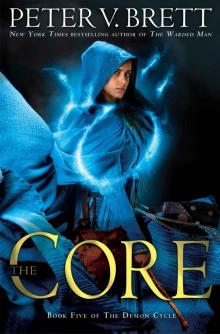 The Core
The Core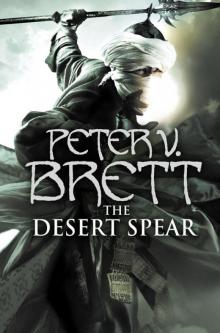 The Desert Spear
The Desert Spear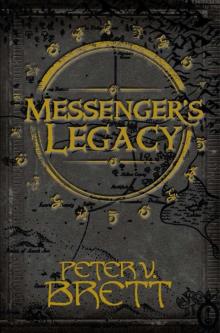 Messenger’s Legacy
Messenger’s Legacy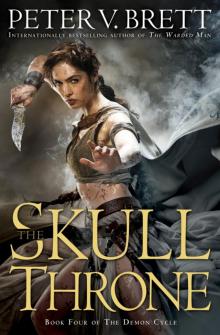 The Skull Throne
The Skull Throne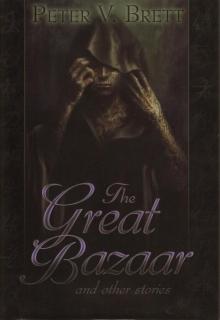 The Great Bazaar and Other Stories
The Great Bazaar and Other Stories The Daylight War
The Daylight War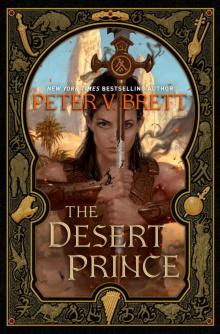 The Desert Prince
The Desert Prince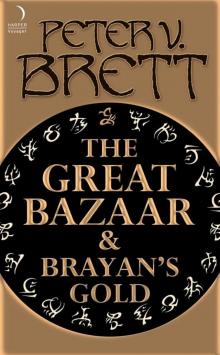 The Great Bazaar & Brayan's Gold
The Great Bazaar & Brayan's Gold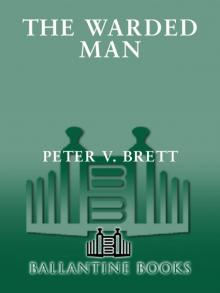 The Warded Man
The Warded Man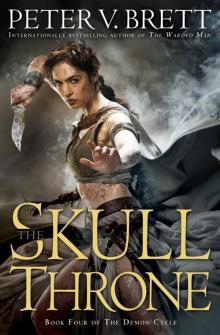 Demon Cycle 04 - The Skull Throne
Demon Cycle 04 - The Skull Throne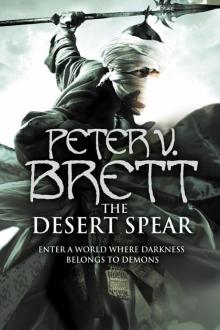 The Desert Spear (demon)
The Desert Spear (demon)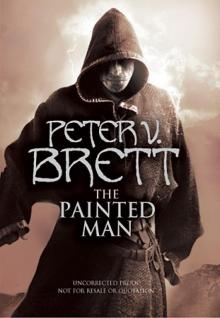 The Painted Man d-1
The Painted Man d-1 The Core (The Demon Cycle, Book 5)
The Core (The Demon Cycle, Book 5)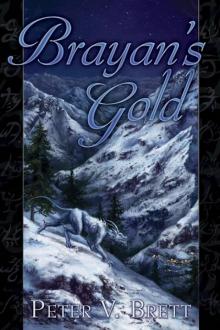 Brayan's Gold
Brayan's Gold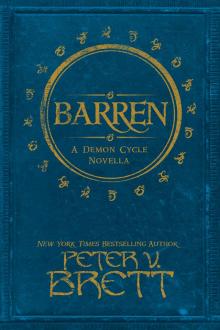 Barren
Barren